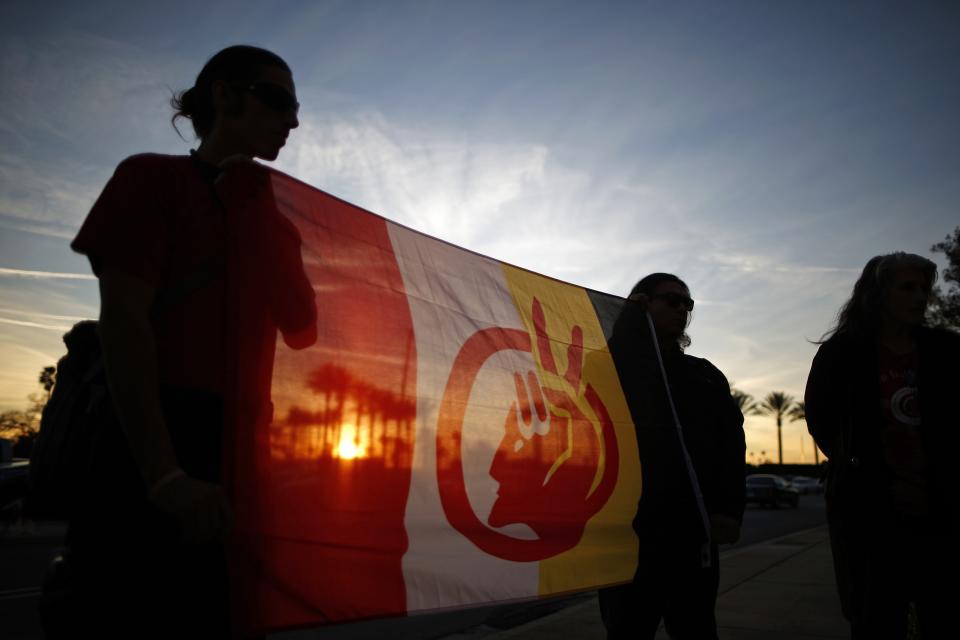Native Americans fight to keep family names on Facebook
Many Native Americans say they have been forced to use fake names on Facebook because of a “real name” policy.
The social media giant requires users to identify themselves by the actual names they use in their everyday lives. However, several Native Americans say they’ve had to verify their traditional names multiple times over the years.
Shane Creepingbear, 32, says he was removed from Facebook several years ago and went through the steps to convince the company that Creepingbear is actually his last name.
“The policy is arbitrary and irrelevant,” he said in an interview with Yahoo News. “I want Facebook to do some self-reflection or acknowledge how they’ve marginalized people.”
Creepingbear, of the Kiowa Tribe of Oklahoma, said he was booted from the social network again last year, coincidentally on Columbus Day/Indigenous Peoples' Day.
This time, however, he was aggravated by the language of the message and refused to “jump through the hoops” to prove he is a real person.
"As unintentional as this whole name policy may be, it really fits into this larger narrative of the erasure of Native Americans from North and Central America,” he said. “It mirrors what society as a whole deems as a ‘normal name.’ I don’t want that part of the story to get lost.”
Creepingbear took to Twitter to air his grievances and included the hashtag #Facebook, to make sure it got their attention.
He also knew a few Facebook employees, who were able to get his account reactivated quickly.
“I’ve spoken to natives since then who have had to send multiple forms of ID,” he said. “I could of put Jane Smith in there and there wouldn‘t have been a question about my name, for example.”
Try again @Creepingbear apparently my family name does not meet @facebook standards. Way to go #ColumbusDay #facebook pic.twitter.com/HYiu55DYgh
— Shane Creepingbear (@Creepingbear) October 14, 2014
Brandy Eves, of Hackettstown, N.J., started a petition on Change.org demanding that the site let Native Americans use their names.
“I petition Facebook, as a Native American, to allow my people to use the names they were given and to stop this racism,” she wrote.
Eves, who is of Cherokee descent, argues that Facebook’s current method is discriminatory and disrespectful.
The petition has already garnered more than 15,000 signatures.
Dana Lone Hill, who is Lakota, says she too was locked out of her account after someone flagged it. She got it reactivated temporarily by providing several forms of identification: a picture ID, her library card and a piece of mail, she said.
But she was kicked out again.
“I had a little bit of paranoia at first regarding issues I had been posting about until I realized I wasn’t the only Native American this happened to,” she wrote in an essay for Last Real Indians website.
This is not the first time Facebook ran into trouble over its real name policy. In October, Facebook Chief Product Officer Chris Cox apologized to drag queens who were similarly blocked from their accounts.
A spokesperson for Facebook told Yahoo News that the company has been working on improving its real name policy over the last six months. Right now, a Facebook team looks into whether someone is using a real name after another user reports it.
He also provided the following statement:
“We are committed to ensuring that all members of the Facebook community can use the authentic names that they use in real life. Having people use their authentic names makes them more accountable, and also helps us root out accounts created for malicious purposes, like harassment, fraud, impersonation and hate speech. Over the last several months, we’ve made some significant improvements in the implementation of this standard, including enhancing the overall experience and expanding the options available for verifying an authentic name. We have more work to do, and our teams will continue to prioritize these improvements so everyone can be their authentic self on Facebook.”






